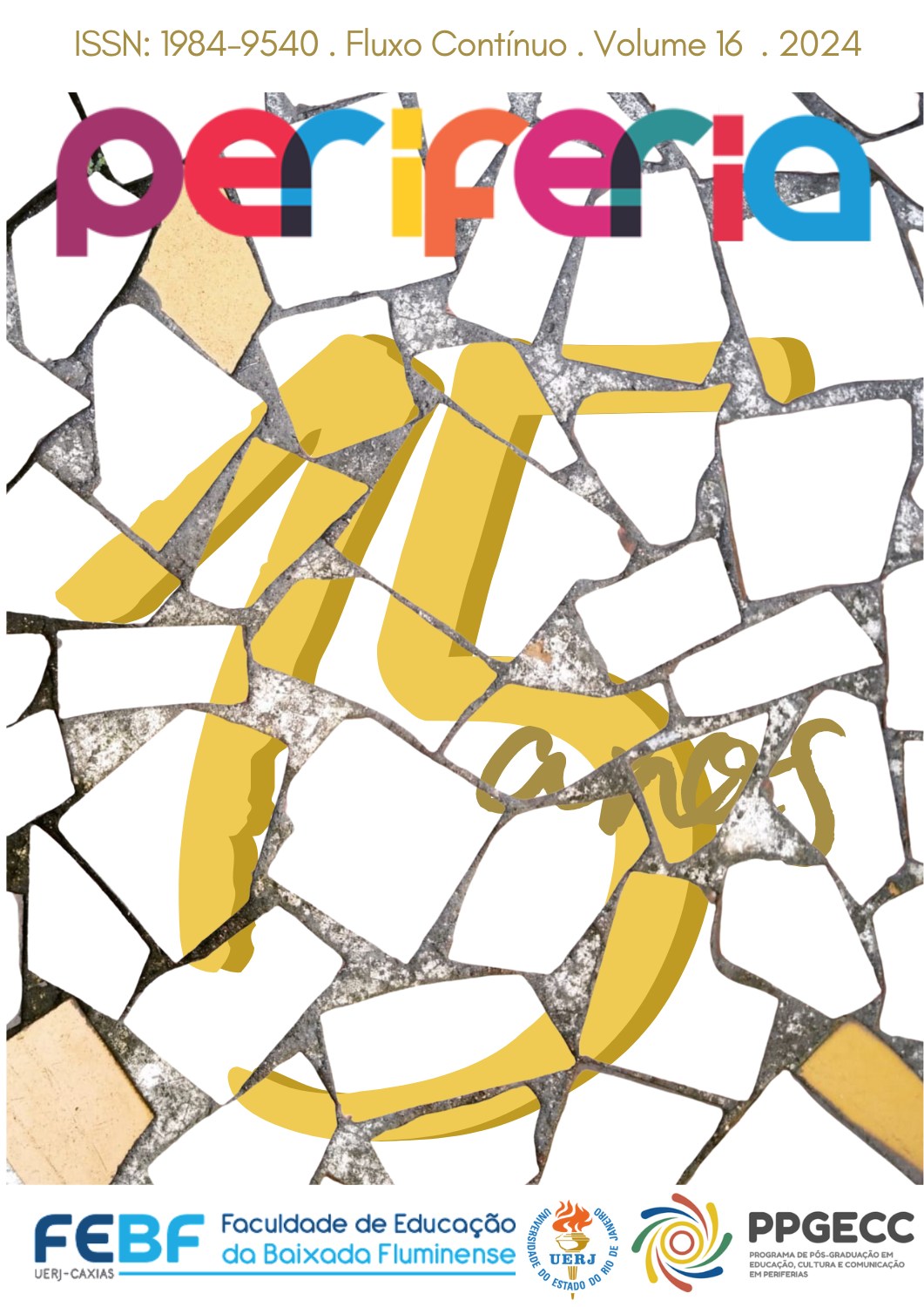CINE Y DIVERSIDAD:
la construcción de un pensamiento emancipador a través de la educación liberadora e inclusiva
DOI:
https://doi.org/10.12957/periferia.2024.76526Palabras clave:
cine épico, diversidad, emancipación, educación liberadora e inclusiva, enseñanza colaborativaResumen
Este artículo tiene como objetivo analizar la enseñanza del arte emancipador, más específicamente del cine, como una posibilidad para promover el pensamiento creativo y crítico, en concordancia con el teatro épico de Bertolt Brecht y el montaje cinematográfico de Sergei Eisenstein. Además, el uso de la enseñanza colaborativa y sus posibilidades para la construcción de un pensamiento democrático e inclusivo, a través de la educación liberadora de Paulo Freire. Para ello, se realizó un análisis documental de formularios de inscripción e informes de la coordinación, la subcoordinadora y dos educadores artísticos de una ONG que atiende a niños y adolescentes de un municipio de Minas Gerais. Además, se realizó un análisis cinematográfico del cortometraje “O Salto” presentado a finales de 2022 por los participantes del proyecto. También se constató el trabajo colaborativo desarrollado entre educadores artísticos, a través de una propuesta de un espacio compartido de enseñanza (danza y bellas artes) en un ambiente de educación no formal, así como la posibilidad e importancia de ampliar el proceso para futuros proyectos a través de un una Enseñanza Colaborativa bien definida, que se guía por el concepto de Educación Inclusiva y emancipadora. Los sujetos de investigación fueron: una profesora especialista en danza; el otro, especialista en Bellas Artes (cine). Se concluye que se ha logrado la enseñanza del arte emancipador a través del género cinematográfico épico. Sin embargo, para futuros proyectos hay reservas respecto a la inclusión de herramientas para la inclusión y la diversidad, como los subtítulos, la audiodescripción y la ventanilla libra.
Citas
BRECHT, B. Estudos sobre teatro. Nova Fronteira, Rio de Janeiro, 1978.
COSTA, P.L. Acessibilidade e função educativa dos museus. Educação Especial: teorias e práticas. DENARI, F. (organizadora). Pedro&João Editores, São Carlos, 2022. (p.13-28). Disponível em: <https://pedroejoaoeditores.com.br/2022/wp-content/uploads/2022/09/EBOOK_Educacao-Especial-teorias-e-praticas.pdf> . Acesso em: maio de 2023.
EISENSTEIN, S. O Sentido do Filme. Jorge Zahar Ed., Rio de Janeiro, 1990b.
ESCUDERO, J. M. G. Cinema Social. Editorial Aster, Lisboa, s/d.
FREIRE, P. Pedagogia do oprimido. Paz e Terra, São Paulo, 1974.
FREIRE, P. Pedagogia da autonomia: saberes necessários à prática educativa, 70 ed., Paz e Terra, Rio de Janeiro, 2021.
INSTITUTO BRASILEIRO DE GEOGRAFIA E ESTATÍSTICA (IBGE). Rio de Janeiro, 2021. Disponível em: <https://www.ibge.gov.br/estatisticas/sociais/trabalho/9221-sintese-de-indicadores-sociais.html.> Acesso em: maio de 2023.
MENDES, E.G. Sobre alunos “incluídos” ou da “inclusão”: reflexões sobre o conceito de inclusão escolar. In: VICTOR, Sônia Lopes; VIEIRA, Alexandro Braga; OLIVEIRA, Ivone Martins de. Educação especial inclusiva: Conceituações, medicalização e políticas. Editora Brasil Multicultural, Campos dos Goytacazes, 2017. P.60-83.
MENDES, E.G, VILARONGA, C.R., ZERBATO, A.P. Ensino colaborativo como apoio à inclusão escolar. Edufscar, São Carlos, 2022.
RANCIÈRE, J. O Espectador Emancipado. WMF Martins Fontes, São Paulo, 2012.
ROCHA, E. H. A potencialização do discurso cinematográfico através da teoria do Teatro Épico de Bertolt Brecht e a capacidade do espectador em ser a sua principal ferramenta de emancipação. Dissertação. Disponível em . Porto, 2019.
ROCHA, G. O Século do Cinema. Editorial Alhambra, Rio de Janeiro, 1983.
ROCHA, G. Revolução do Cinema Novo. Cosac Naify, São Paulo, 2004.
ROSENFELD, A. O Teatro Épico. São Paulo Editora S.A., São Paulo,1965.
SARTON, E. SMITH, M. Série Textos de Reflexão. UNICEF: Inclusão da
Deficiência, 2018. Disponível em <https://www.unicef.org/esa/reports/education-think-pieces#disability-inclusion> . Acesso em maio de 2023.
SAMPIERI, R.H. COLLADO, C.F. LUCIO, M.B. Metodologia de Pesquisa, 5. Ed, Porto Alegre; Penso, 2013.
STAINBACK, S., STAINBACK, W. Inclusão: um guia para educadores. Artmed, Porto Alegre, 1999.
UNESCO. DECLARAÇÃO DE SALAMANCA: Sobre Princípios, Políticas e Práticas na Área das Necessidades específicas. 1. 1994. Disponível em: <http://portal.mec.gov.br/seesp/arquivos/pdf/salamanca.pdf>. Acesso em: maio de 2023.
Descargas
Publicado
Cómo citar
Número
Sección
Licencia
Los autores que publican en esta revista concuerdan con los siguientes términos:Los autores mantienen los derechos de autor y conceden a la revista el derecho de primera publicación, con el trabajo simultáneamente licenciado bajo la Creative Commons Attribution License que permite el compartir el trabajo con reconocimiento de la autoría del trabajo y publicación inicial en esta revista.
Los autores tienen autorización para asumir contratos adicionales por separado, para distribución no exclusiva de la versión del trabajo publicada en esta revista (por ejemplo, publicar en repositorio institucional o como capítulo de libro), con reconocimiento de autoría y publicación inicial en esta revista.
Los autores tienen permiso y son estimulados a publicar y distribuir su trabajo en línea (por ejemplo, en repositorios institucionales o en su página personal) a cualquier punto antes o durante el proceso editorial, ya que esto puede generar cambios productivos, así como aumentar el impacto y la cita del trabajo publicado (ver el efecto del acceso libre).



